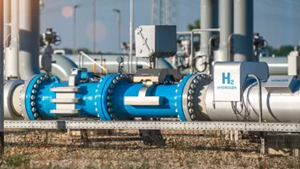(Bloomberg) – Months after UN-led climate talks, the demand for natural gas from the host of this year’s COP29 is growing in Europe and elsewhere.
Shah Deniz platform (Source: bp)
Azerbaijan, which has the presidency of the 29th United Nations’ Conference of the Parties, exported almost 24 Bcm of natural gas in 2023 with half of the volumes going to Europe, according to Energy Ministry data.
“There’s absolutely no hint that” the gas demand will decline, Deputy Energy Minister Orxan Zeynalov said in an interview in the capital Baku. “Right now, we have a long list” of countries — both old and new buyers — for an additional 30 Bcm.
Producers like Azerbaijan have been stressing that the COP28 text also recognized the role that “transition fuels” like natural gas can play in moving to clean energy.
The bp Plc-led Shah Deniz deposit in December 2020 started supplying natural gas to Italy, Greece and Bulgaria via the so-called Southern Gas Corridor — a chain of pipelines connecting Azerbaijan’s Caspian Sea shores with Europe via Georgia and Turkey. Three more European countries, Romania, Hungary and Serbia, have since joined the list of buyers.
After Russia’s invasion of Ukraine triggered an energy crisis in the continent, European Commission President Ursula von der Leyen visited Baku in July 2022 and signed a memorandum of understanding to double natural gas purchases from Azerbaijan by 2027.
Despite the rising demands for its natural gas — exports to Europe last year rose more than 40% above 2021 levels — there are stumbling blocks. Getting an additional 10 Bcm to the continent by 2027 could prove difficult as European buyers are reluctant to commit to long-term gas purchases from Azerbaijan.
“We can’t do this without long-term guarantees that our gas will be needed,” Zeynalov said. “What will happen after 2040, for instance?”
Another hurdle is a lack of funding to expand the existing export infrastructure as some European lenders no longer finance fossil fuel projects. Energy Minister Parviz Shahbazov earlier complained that his country hadn’t received the “close cooperation” it expected from the European Union to boost natural gas supplies to the 27-nation bloc.
“Pipeline gas cannot be delivered in big volumes” without long-term sales contracts, Shahbazov said Tuesday at an energy conference in Baku, adding that his government expected the EU to help finance the expansion of the infrastructure and secure long-term contracts.
This article was originally posted at www.worldoil.com



Be the first to comment